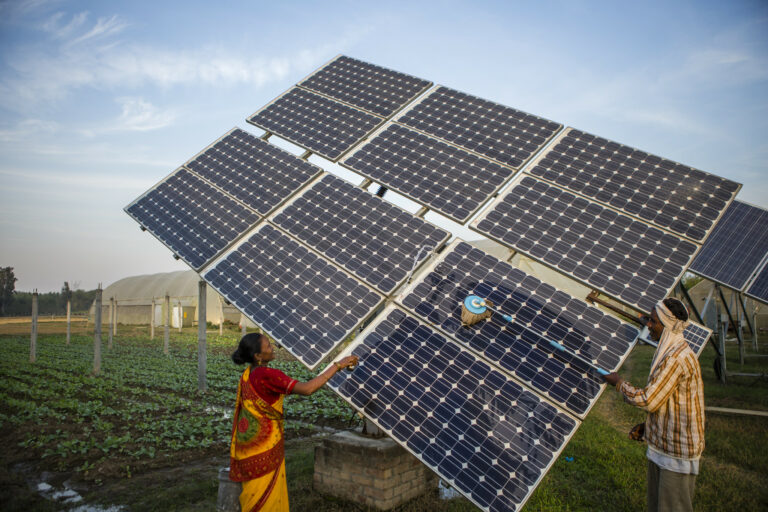Submission to the United Arab Emirates Just Transition Work Programme on the topic of the second dialogue

Photo: Prashanth Vishwanathan/IWMI via Flickr
Download
This submission draws on research conducted at the Grantham Research Institute on Climate Change and the Environment to present eight key recommendations for Parties to the UNFCCC which address the priorities of the second dialogue of the United Arab Emirates (UAE) Just Transition Work Programme (JTWP) and relate to its three focus areas:
- Approaches for empowering all actors and segments of the society for a fair and inclusive workforce transition to meet Paris Agreement goals.
- Unpacking the full range of means of implementation (finance, technology and capacity building) for a just transition of the workforce: exploring current approaches, opportunities and gaps.
- International cooperation and partnerships for people-centric and equitable just transitions.
Key recommendations
- Proactively design policy and investment pathways to pursue both climate action and poverty reduction. Setting poverty reduction and climate action against one another as competing priorities is misguided. Bolstering the fossil fuel status quo will ultimately be to the detriment of people living in poverty. Well-designed policy and targeted investment can deliver both positive climate outcomes and alleviate poverty. Policy design should focus on four critical areas: resource management; carbon pricing, fossil fuel subsidies and redistribution; green job creation; and social inclusion.
- Support inclusive enterprise landscapes to deliver economic growth, employment opportunities, innovation and positive climate outcomes. Supporting and mobilising small and medium-sized enterprises (SMEs), including women entrepreneurs, is important for delivering people-centric and equitable just transition pathways. SMEs form a critical part of most economies. They are often highly vulnerable to climate change but are highly responsive to change, making them important strategic actors in economic transitions. Multi-stakeholder partnerships (MSPs) have the potential to support the scaling up of climate action among some of the most vulnerable private sector actors and to plug gaps in development finance.
- Adopt an intersectional and gender-sensitive approach to climate action and climate finance. The consequences of neglecting gender considerations in climate policy are profound. Policies that overlook the gendered dimensions of both climate change and responses to climate change risk perpetuating existing inequalities and slowing down the transition to a green economy. This will undermine global efforts to achieve net zero emissions and a climate-resilient future. Parties should build consensus around the indicators used to measure progress and support the collection of data that captures the specific needs and contributions of women in climate action, thus enabling more targeted and effective interventions.
- Use Nationally Determined Contributions (NDCs), National Adaptation Plans (NAPs) and Long-Term Low Emission Development Strategies (LT-LEDS) as vehicles and communication tools to support investment that is aligned with a just transition. To enable the allocation of capital towards net zero, Parties need to send clear signals to investors and corporations that they are committed to implementing just transition policies. Robust just transition policies indicate that a country is addressing the socioeconomic impacts of the transition, creating equal opportunities for communities and businesses, and reducing potential resistance against climate action. The next round of NDCs, due in 2025, provides a timely opportunity for Parties to communicate existing national frameworks along with concrete measures.
- Support the development and adoption of national sector pathways that consider just transition principles, especially for emerging markets and developing economies (EMDEs). To facilitate a just transition, investors need clarity over which businesses and sectors align with emissions reduction pathways that are consistent with Paris Agreement goals. Global standards and pathways do not always consider the local realities and development priorities of EMDEs. Developing these pathways at a national level, guided by a national transition plan (NTP) or an enhanced NDC, can play a crucial role in guiding the required investments.
- Mainstream just transition principles in national climate change legislation and policymaking. The pathway to achieving the goals of the Paris Agreement through a people-centric approach will be unique to each country. National climate governance systems can be designed in a way that is tailored to the local context to support the mainstreaming of just transition principles in decision-making. Lessons can be learned from existing climate change policies and legislation, and from emerging just transition litigation cases. To help mainstream people-centric approaches in the private sector, financial regulations on climate change should also incorporate just transition principles.
- Develop and implement climate policy based on inclusive stakeholder engagement and public participation processes. The deep and rapid social and economic transformations required to address the impacts of climate change will significantly affect citizens’ lives, choices and behaviours. It is necessary to meaningfully engage the public in decision-making to ensure a just transition. Climate assemblies are a potentially powerful tool that can be used to ensure just transition outcomes, increase ambition on climate policy and change the dynamics of climate governance.
- Empower Ministries of Finance to drive forward a just transition and unlock the means to implement it. Ministries of Finance have significant levers they can pull to increase the climate finance and accelerate the climate action needed to deliver a just transition towards low-carbon, climate resilient development. Parties should ensure Ministries of Finance have a strong mandate to act on climate and invest in climate capacity-building across government. The Coalition of Finance Ministers for Climate Action provides opportunities for peer learning and exchange.

